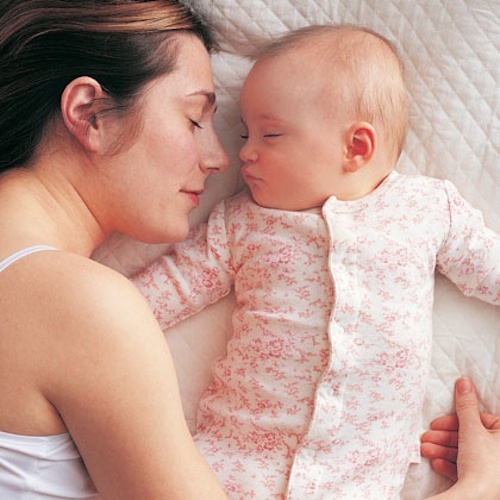
Are tired babies (or toddlers) keeping you up at night, mamas? Our Editor (and her baby) worked with sleep consultant Nicole Booth from Calmer Kids Sleep Solutions, and she’s ready to spill the beans on sleep training. And if you don’t want to read her personal story, jump down to the bottom for Nicole’s Top Tips!
I started my job with Sassy Mama the week after my baby turned four months old. The conditions were less than ideal for a fresh start: Maggie was waking up three to four times a night for feeding, never sleeping more than three hours at one go. I was worn out and my brain felt fuzzy.
I was also dejected because Maggie had been a great sleeper from the age of 6 weeks, typically waking up just once or twice per night. When she hit 3 months, though, she transferred to a crib from a bassinet (as well as a swaddle blanket to a sleepsuit), and her good habits seemed to go out the window.
I’d heard about the 4-month sleep regression, which is tied in to major leaps in baby’s mental and physical development. Suddenly there is so much more for them to see and do, of course they want to sleep less! So I crossed my fingers and hoped this was just a phase, but each night Maggie seemed to grow more agitated.
On a few occasions she woke up every two hours, then entered stretches where she refused to do anything but wail from about 3-5am. There was no way she was hungry – she’s above 90th percentile for weight and her pediatrician assured me my little chubster was getting plenty of food during the day.

Purely by chance, during my first week on the job I was put in touch with Nicole Booth of Calmer Kids Sleep Solutions. She’s a registered nurse, certified “Sleep Sense” consultant and mum to 21-month-old son Alfie, who also struggled with sleeping once upon a time. We discussed trying out her program with a consultation, and I agreed to write about the experience (good or bad!). Suffice to say, I’ve been singing Nicole’s praises to all my mama friends since she pretty much changed our lives a month ago.
We started with a 15-minute phone call, in which I told Nicole about Maggie and our specific problems. I also talked about my own preferences: I couldn’t bear the “cry it out” method, but wasn’t getting results from the strategies in the much gentler No Cry Sleep Solution. Nicole took all of this on board, emphasising that her approach never requires parents to leave a crying baby alone if they don’t feel comfortable.
Next, she sent me a detailed questionnaire where I provided data on Maggie’s sleep habits, including typical nap and bed times, sleeping set-up, evening routine, and what I did overnight. I was breastfeeding her on demand (and often feeding her to sleep at bedtime); I kept reading that babies are meant to be put down drowsy but awake to soothe themselves to sleep, but the bond of being able to instantly calm and comfort her kind of pushed that out of my mind.
After a few days, Nicole sent me a detailed, personalised “sleep plan”, which included analysis of our habits (overall pretty good, but we needed to make bed times more consistent, and I needed to break the sleep/feed association), and a customised daily schedule. For instance, the bedtime routine was the following:
6:45pm: Bath time
7:00: Pyjamas
7:05: Breastfeed (but keep the baby awake!)
7:20: Storytime
7:30: Put her down in her crib awake
Nicole also recommended a strategy I came across in The No Cry Sleep Solution: employing repetitive key phrases that both comfort the baby and signal to her that it’s bedtime (“Night night”, “See you in the morning”, “Sweet dreams”, etc.).
She then followed up with an in-home visit, both to meet Maggie and look at her nursery set-up. She also talked me through the daily routine, and explained that the plan could take up to two weeks to take effect (although typically people see results in 3-5 days).
For the first three nights, when Maggie went down, or if she cried, I could sit by her bed and comfort her. For nights 4-6, I was to lessen the interaction and sit a few feet away from her while repeating the magic words. After that, I could stay in the room, but needed to let her settle herself on her own.
Although I’d come across much of the information Nicole provided during my research, it was great having it all pulled together and synthesised into an easy-to-follow plan (particularly when my sleep-deprived brain was so addled).
What I appreciated most, though, was Nicole’s positive support and encouragement. Having her tell me “You can do this!” and “Trust me, I’ve seen this hundreds of times before” was so re-assuring, I actually started to believe it! She also checked in throughout the first week, answering my questions and doling out further suggestions as needed.
By some strange coincidence, the day we decided to start sleep training our baby monitor broke. I could still hear Maggie’s loudest cries, but it did mean I was less likely to rush to her if she was just making agitated noises in her sleep (which is common among babies as they learn to tie together sleep cycles). I kept a running log of the first few nights, here’s how they went down:
Night 1: Took 10 minutes to shush her to sleep (down at 7:40pm); she woke up at 1:15 and was inconsolable. I tried the magic words, rubbing her chest, picked her up but resisted my urge to feed her. Understandably she was probably quite confused and upset since this was the very first time I didn’t feed her during a night waking. Fast forward to 2:50am, still wailing, I’m frustrated and now uttering the magic words through clenched teeth, until finally I decide to just leave her be for a bit. By 3am she’s quiet, and ends up sleeping until 8:10am. On the plus side, she only woke up once. On the downside, she wailed for nearly 2 hours between 1-3am and we both came away exhausted and upset.
The next morning, Nicole called me to debrief. She wasn’t surprised to hear that Maggie protested when she didn’t get fed, but assured me the second night would be just a little bit easier.
Night 2: It took just 3 minutes to shush her to sleep (a big improvement!). She woke up crying again at around 1:30am. Taking Nicole’s advice, I decided to wait 10 minutes before entering her room. After 6 minutes, she stopped! She then went back to sleep until 8:05am.
Night 3: Maggie was fussy as I fed her, which did not seem to bode well for putting her down. But then I placed her in her crib (usually that’s when the screaming starts) and she quieted down immediately. She calmly allowed herself to be zipped into her sleepsuit, and started playing with her lovey. I said the magic words a few times and rubbed her chest, but she barely seemed to notice me, so I told her I loved her and calmly left the room at about 7:45pm. We didn’t hear another peep until 8am the next morning!
Night 6: Slept through the night (as far as any of us could tell) for 12:45! She went down tired but awake, but when I left her she didn’t make any noises and must have eventually drifted off to sleep.
I continue to be amazed it took just three nights for Maggie to learn to sleep through the night. Clearly she was always capable of it, but I needed to have the reassurance and encouragement to stay strong and resist my urges to always feed her.
I know that every parent feels differently about sleep training, and whether certain approaches will traumatize (or spoil) their child, but for me, being well-rested (on both our parts) would make us both happier. When Maggie wakes up in the mornings now (usually around 7am), she is all smiles and even squeaks with delight when I go in to pick her up. It’s the most wonderful way to start the day!
She does occasionally wake up at night, but is generally able to soothe herself back to sleep without our intervention. I feel like I’m functioning on a higher level because I can actually sleep in 6-8 hour stretches again! Those first few nights were tough, but in the long run they were well worth it in return for my super-happy, well-rested baby.
- Babies need to learn to self-settle without external “props” like pacifiers
- Know your baby’s tired signs (rubbing their eyes, yawning, general fussiness)
- Be CONSISTENT in your routine
- An early bedtime (around sunset) will actually help baby sleep longer
- We’ll say it again: CONSISTENT routines are the key to success with babies
- Honour naptime: aim for at least an hourlong nap, and try for at least an hour if baby is resisting
- Avoid night feeds to break the feed/sleep association
Sleep consultations start at $300 for a mini-consult including customised sleep plan and follow-up calls. Not sure? Nicole offers a free 15-minute phone consultation, as well as group seminars.
Calmer Kids Sleep Solutions
Tel: (+65) 8322 3302 or email [email protected]
www.calmerkids.net
Featured image sourced via Pinterest, image #1 sourced via Pinterest, image #2 sourced via Pinterest, image #3 sourced via Pinterest, image #4 sourced via Pinterest, image #5 sourced via Pinterest, image #6 sourced via Pinterest






 View All
View All




 View All
View All











 View All
View All












